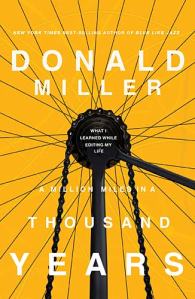Tags
 The premise of A Million Miles in a Thousand Years is that the principles of storytelling can be applied to the creation of a meaningful and fulfilling life. Don discovers this while making a film based on his earlier book Blue Like Jazz as he finds that he isn’t living a good story, so he sets out to learn what makes a good story and how to turn his life into one. What results is a very personal journey that also speaks volumes to the wider, universal audience.
The premise of A Million Miles in a Thousand Years is that the principles of storytelling can be applied to the creation of a meaningful and fulfilling life. Don discovers this while making a film based on his earlier book Blue Like Jazz as he finds that he isn’t living a good story, so he sets out to learn what makes a good story and how to turn his life into one. What results is a very personal journey that also speaks volumes to the wider, universal audience.
This was actually my second reading of the book. Having previously read Blue Like Jazz I was keen to pick this one up as soon as it hit the shops back in 2009. After that first reading I began my own very limited story plan which led to me volunteering with a local charity working with homeless and vulnerable people. It would be hyperbole to say that this life changing move was entirely down to reading Don’s book but it certainly played a part in helping me to frame that new story in my life.
If I am honest my conscious story planning has waned since then. It is not that the story I began has died but rather that it gathered such pace that it has run away with itself a little. That was one reason that I decided to go back for a second reading, to revisit the content and my own story plan and put it back on a conscious trajectory. When I consider the memorable scenes that have made up my volunteering story I realise that something important has been lost (as well as much being gained) as I have moved from being a “frontline” volunteer to being a trustee and I need to address that.
I have also noticed a need to balance the demands of different strands of life so that they include those closest to us. It is possible for a well-meaning and altruistic plan to become a lone journey if we are not careful and too many personal goals can lead to others being excluded. A good story can actually end up creating an unintended bad story along the way if we allow it to run unchecked. In my own desire to be part of a grand epic I managed to lose sight of my responsibilities to those I care about most and the joy that those responsibilities bring with them.
Don writes from a Christian faith perspective but the principles of story can be used as a tool in your life whether you are talking to God or your paradoxical chimp Kevin. I don’t mean to be flippant when I say that, there are many crossovers between faith and psychology, as well as crucial differences, and you need not share Don’s faith to draw value from his writing. The book is accessible and easy to read and the takeaways are quite simple and easy to digest, helped by not only Don’s journey of discovery but also a host of other people he meets who have moved from living destructive stories to life-giving ones.
Whether it is the former addict proving to himself that he has changed by completing a challenge to cycle across America having failed in the past to deliver on his commitments to his wife and children, or the simple memory making of the Goff family as they all jump fully clothed into a river to mark their farewell to house guests, the book is full of lessons that we can take into our own lives to make them better for us and for the world we inhabit.

